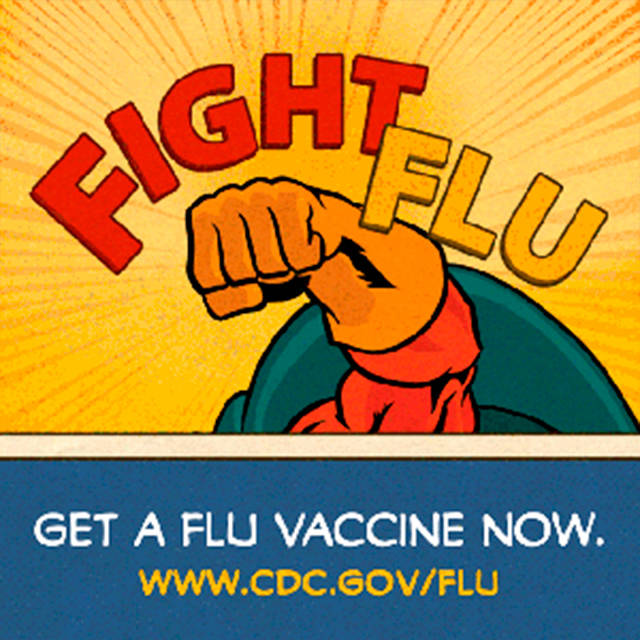The following was written by Meredith Li-Vollmer for Public Health Insider:
With the holidays drawing near, many of us look forward to travel or seeing family and friends. And just as our schedules get busier, it’s also the time of year when the flu starts to circulate. We turned to Libby Page, manager of our immunizations program, to get the scoop on flu vaccine.
Why is it important to get vaccinated now?
Autumn is often the time when flu activity picks up and it can take at least two weeks from the date of vaccination for most people to generate vaccine induced immunity.
Also, children aged 6 months through 8 years who have not been vaccinated in previous years will need two doses of flu vaccine. To provide the best protection, it’s important that they get their first dose as soon as possible and get their second dose at least 4 weeks later.
When is it too late to get my flu shot?
Getting a flu vaccine early is the most effective, but the CDC advises that people get vaccinated as long as flu viruses are circulating because the duration of the flu season can vary. For example, if you get a flu shot in December or later, you could still be protected for the remainder of the flu season, which can last well into the spring.
We heard that the intranasal vaccine (e.g., FluMist) is still not recommended this year. Why not?
The CDC continues to recommend against using the nasal flu vaccine for the 2017-18 flu season based on three years’ worth of evidence suggesting the vaccine was not effective. Researchers are still working to determine why the intranasal vaccine doesn’t work as well as injectable influenza vaccines. And while it is unfortunate to lose one of our vaccine options, the change in the CDC recommendations is an example of using national vaccine effectiveness data to ensure the most beneficial public health practice.
Fortunately, injectable influenza vaccines performed well last season and offered substantial protection against flu illness.
What other options are there for people who don’t like needles?
The intradermal flu shot has been available since the 2012-13 flu season and provides the same level of protection as the regular flu shot. The intradermal vaccine is injected into the skin through a very small needle that is actually 90% smaller than a standard size needle. It goes under the skin but not into the muscle. The microneedle is only 1.5 mm long—that’s the thickness of a penny! The intradermal shot is available for adults 18-64 years of age.
Jet injectors offer an alternative to needles, but they aren’t yet widely available. They rely on a high-pressure, narrow stream of fluid to penetrate the skin. Jet injectors can be used for certain types of flu vaccine for adults ages 18 through 64.
Older adults are one of the groups at higher risk for severe illness and hospitalization from flu. Is there a type of vaccine you’d recommend for this age group?
There are two vaccines intended for people who are sixty-five years and older. The “high dose” vaccine has four times as much antigen as the regular flu shot and has been found to be 24% more effective in preventing flu infections. Another option is the “adjuvanted” flu vaccine, Fluad. This vaccine is designed to create a stronger immune response to vaccination, and one study showed that Fluad was 63% more effective than standard dose, unadjuvanted flu shots.
With both of these options, you are more likely to experience some common side effects during the week after you get the shot, such as fatigue, soreness at the injection site, and fever. But for most people, it’s certainly a better alternative than getting a full-blown case of the flu!
Are all of these vaccine options widely available at doctor’s offices and pharmacies?
Some of these vaccine options are more widely available than others. We encourage people to visit HealthMap Vaccine Finder to search by location for clinics and pharmacies that carry specific types of flu vaccine. You can also call your doctor’s office to find out which flu vaccine they have for their patients.
People always want to know: can you get the flu from the flu shot?
While this is a very common belief, it is not possible to get the flu from a flu shot. The injected flu vaccine is made from an inactivated – or killed – virus, so it cannot transmit infection. Occasionally people feel like they have symptoms after getting a vaccine and there are a couple of reasons this happens:
- When the vaccine stimulates the immune system to generate protection against influenza, it can cause side effects that seem like a mild version of the flu, such as fatigue, muscle aches, low-grade fever, or headaches. This is relatively common, but usually lasts a day or two. But it’s not the same as getting the flu, which is much more severe, lasts much longer, and is contagious.
- It’s possible that the person already had been infected with a flu or cold virus before they got the vaccine and the appearance of symptoms happened to coincide with the timing of the vaccine.
What’s your personal reason for getting a flu vaccination?
I don’t want to miss work and I don’t want my kids to miss school, so we all get the flu shot. And I look forward to my holiday plans. I just don’t have time to be slowed down by the flu!
I also would hate to spread flu to my relatives and co-workers, or to other people in the community. You never know if someone you encounter might be more vulnerable to serious complications from the flu, like the elderly, pregnant women, infants, or people with weakened immune systems. I don’t want to risk spreading flu to someone who might end up in the hospital.


